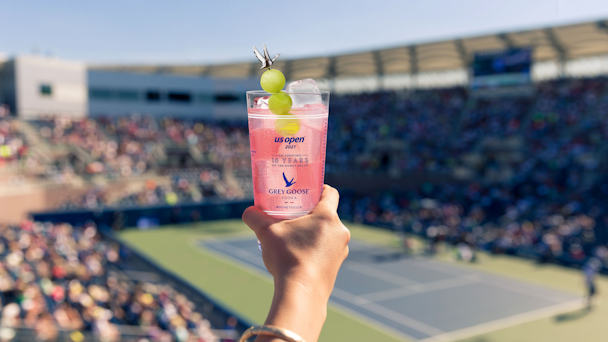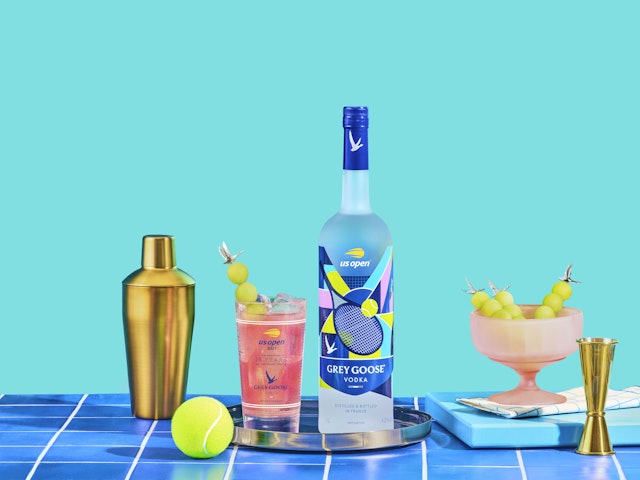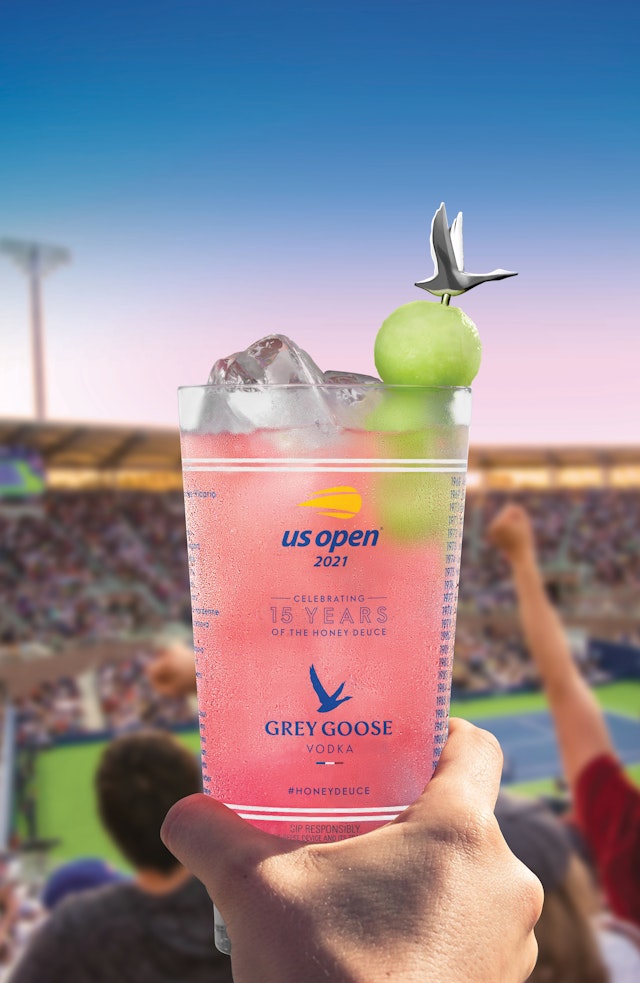Grey Goose’s marketing VP talks US Open, innovation and ‘mindful drinking’
With the US Open officially under way, Novak Djokovic and Naomi Osaka aren’t the only ones serving up crowd pleasers. Grey Goose, the French-made vodka brand, is entering its 17th year as a tournament sponsor – and is celebrating the 15th anniversary of the official cocktail of the event: the honey deuce. The brand’s vice-president of marketing sits down with The Drum to talk tennis, pandemic-induced mixology trends and telling a strong brand story.

2021 marks the 15th anniversary of the debut of the Grey Goose honey deuce cocktail
The US Open is in full swing and Grey Goose has worked hard to make itself an integral part of the iconic American sporting event.
A longstanding partner of the event, the brand made its biggest splash with the honey deuce, the Grey Goose-based cocktail now considered a staple of the tournament experience. As legend has it, Grey Goose tapped New York-based restaurateur Nick Mautone to craft a signature cocktail for the event in 2006. Mautone experimented with various recipes before settling on the concoction: Grey Goose vodka, raspberry liqueur and lemonade, garnished with a skewer of honeydew melon balls that call to mind, well, tennis balls.
Grey Goose now sells about 200,000 honey deuces during the tournament each year. “What’s great for us is the Grey Goose honey deuce ... has become just a part of the US Open experience. Almost like what a mint julep is to the Kentucky Derby, that’s what the honey deuce is to the US Open,” says Grey Goose’s vice-president of marketing Aleco Azqueta, who helped launch the brand’s partnership with the US Open in the early 2000s.
And the pandemic wasn’t about to temper Grey Goose’s odds of scoring big at last year’s event. With fans stuck at home in 2020, USTA Billie Jean King National Tennis Center in New York saw no sweat-beaded spectators queuing up to purchase a honey deuce in a commemorative Grey Goose cup. So the vodka giant brought the honey deuce to fans – in the form of an at-home honey deuce kit sold online. And while Azqueta is excited to have fans back in the stands this year, the kits performed so well that the brand has decided to continue selling them this year –going so far as to offer one-hour delivery in select cities including Chicago, Miami and New York City.
This is all part of the brand’s attempt to goose sales lost amid the pandemic. Combined with innovations such as low-ABV infused products as well as major sponsorships and activations — including the brand’s partnership with the US Open — the effort could help get the Goose flying high again.
After all, the vodka category is growing increasingly valuable. According to the latest data from the Distilled Spirits Council of the United States (DISCUS), in 2020 nearly 77m 9-liter cases of vodka were sold in the US, equating to some $6.9bn in revenue for distillers. DISCUS research suggests that while the sales of low-priced vodkas are not improving, sales of premium vodkas are on the rise, driving overall category growth.
Though Grey Goose – born in France in 1996 and sold to beverage giant Bacardi in 2004 – is among the category’s top players, a 2021 report by The Spirits Business suggests that the brand faced pandemic-related setbacks, suffering a 17.9% dip in sales last year. This year, Grey Goose is looking to rally.
Tapping into today’s trends
The popularity of Grey Goose’s DIY honey deuce kits speaks to a larger trend happening in the spirits space: the rise of at-home mixology. With consumers spending more time at home due to Covid restrictions, virtual cocktail-making classes and mixology events as well as at-home cocktail kits such as Grey Goose’s have taken off.

“We’ve seen, coming out of Covid, a kind of rise of the home mixologist,” Azqueta says. “I like to say when you open a bottle of wine, it’s like making a grilled cheese – but when you actually make a cocktail, it’s like having a home-cooked meal. People are really enjoying the process of learning about cocktails and making cocktails.”
Grey Goose has been able to capitalize on this trend not only with its home cocktail kits, but also with a larger investment in e-commerce as well as new product development.
“Covid accelerated e-commerce in general for spirits,” says Azqueta. “I have a lot of friends who didn’t even know you could order a bottle of spirits online before Covid. So we’ve seen that part of the business grow really rapidly. That’s something that we’re really continuing to do a lot with these cocktail kits, and enabling spirits drinkers to drink at home and have fun making drinks and entertaining their friends.” He says the honey deuce kit – which in 2020 was available in just 17 markets and is now available in 40 different states – is just the beginning.
In February of this year, Grey Goose debuted what Azqueta calls the brand’s “biggest innovation since Grey Goose itself” – Grey Goose Essences, a new collection of botanicals- and fruit-infused vodka-based beverages. Grey Goose Essences have a lower alcohol content than traditional vodka, weighing in at 30% ABV compared to 40% ABV. The product currently comes in three flavors: Strawberry & Lemongrass, Watermelon & Basil and White Peach & Rosemary.
Grey Goose Essences, though not free of alcohol, could speak to consumers’ growing demand for healthier options and reduced alcohol consumption. “With Grey Goose Essences, it was really tapping into trends that are important to consumers [like] health and wellness and mindful drinking,” says Azqueta. “It’s a lower-impact spirits experience, but we’re not compromising any of the flavors.”
The power of a brand story
While Grey Goose is investing in new product development and seeking to address consumer demands for mindful drinking options and at-home cocktail-making, it is still being forced to compete in an increasingly crowded playing field. DISCUS data indicates that vodka accounts for the largest share of spirits sales in the US, claiming an impressive 31% of the market. New small-batch and craft distillers, as well as a growing number of premium vodka brands, are contributing to the category’s growth.
In such a competitive space, it can be hard to secure – and maintain – a competitive advantage. But Azqueta says Grey Goose isn’t too worried. “People are really concerned, [saying,] ‘Why would I pay a premium for Grey Goose versus other vodkas?’ We really just have a great intrinsic story in the brand – and I think that’s really what sets us apart. We have a Maître de Chai, our cellar master, which is very unusual for vodka. And we’ve only had one since our existence.”
Azqueta is referring to François Thibault, a renowned cognac cellar master who in the 1990s was approached by businessman Sidney Frank with a proposition. Frank wanted to create a high-end French-made vodka brand marketed and sold primarily in the US market. He tasked Thibault with translating his cognac distilling skills to vodka production. Lo and behold, Thibault was up to the challenge, and by 1998 the brand had been dubbed the best-tasting vodka in the world by the Beverage Testing Institute, before being acquired by Bacardi some eight years later.
Azqueta argues that the quality of Grey Goose’s product comes not only from the attention to detail provided by Thibault, but also the high quality of ingredients that come together in the production process. “A lot of vodkas are always talking about ‘distilled 10 times, 20 times’, but what makes us unique is we’re distilled once because we use such great ingredients from the onset. We use water from the Gensac-La-Pallue region, Picardy wheat, and then we do have this Maître de Chai that oversees the whole production process. What makes it special is that it’s still made in the same way that François [Thibault] created the brand 25 years ago.”
Ultimately, Azqueta says, Grey Goose’s success today is due in part to this history. “Consumers just really want to hear the stories behind the brand,” he says. “As long as your brand has an authentic and genuine story, that’s what’s going to resonate. [That’s why] the brand has reached that iconic status.”


